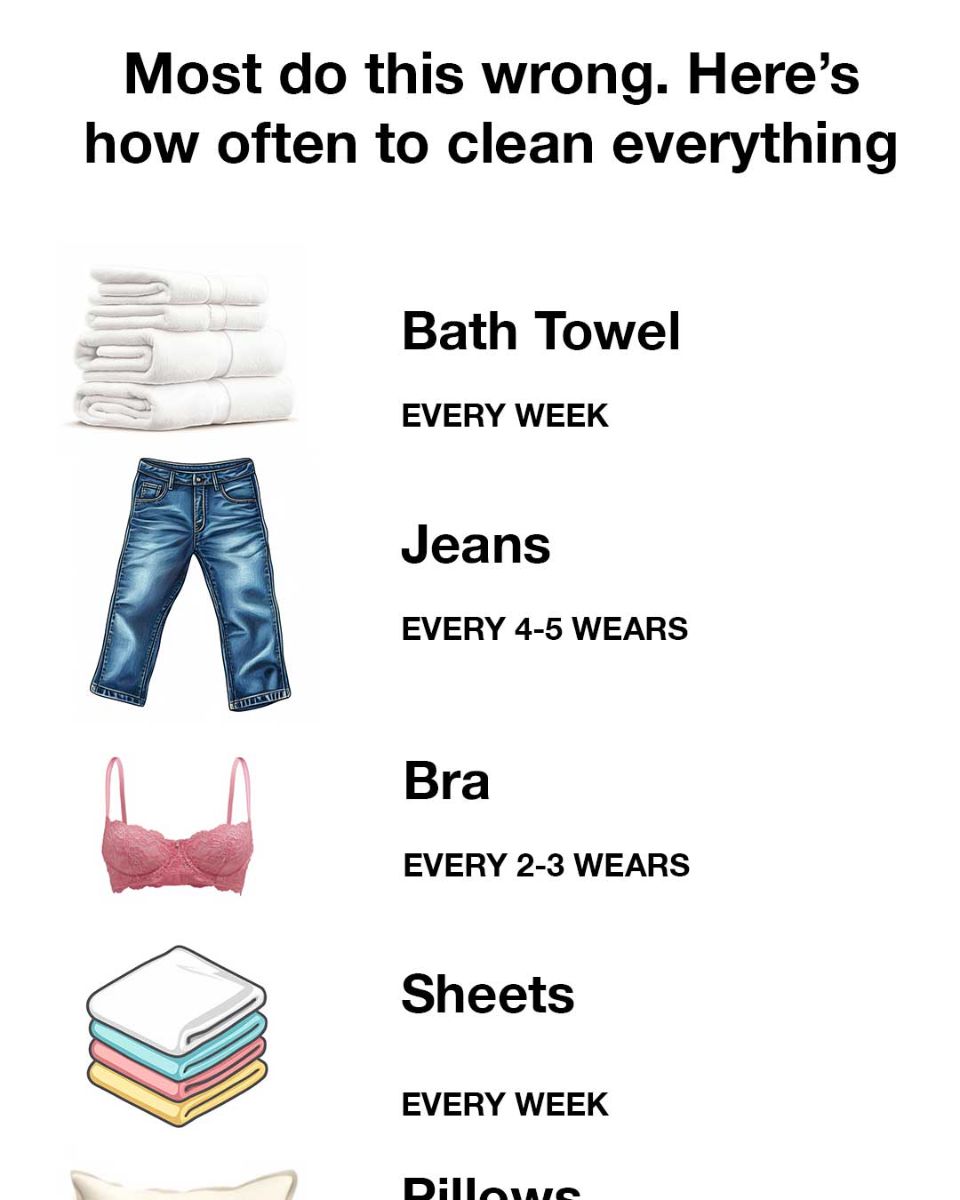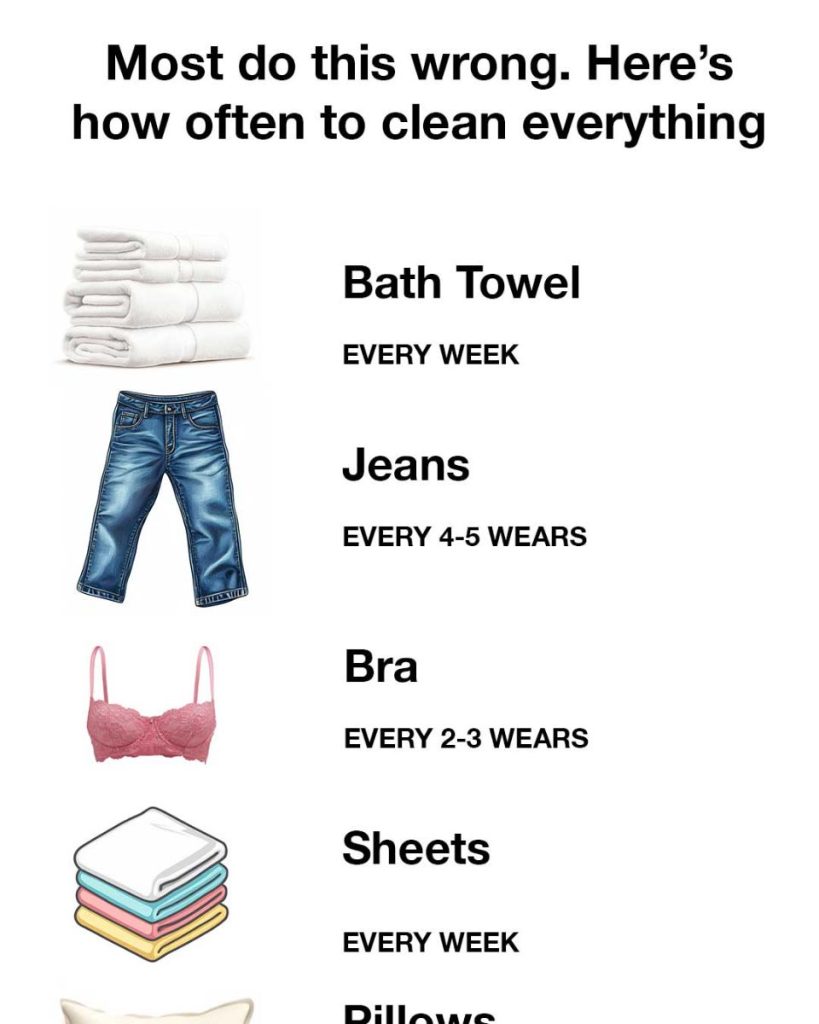Cleaning is not just about aesthetics; it’s a crucial aspect of maintaining a healthy living environment. Regular cleaning helps to eliminate germs, allergens, and other pollutants that can accumulate over time.
By keeping our surroundings clean, we reduce the risk of illnesses and improve our overall quality of life. Moreover, a clean environment can enhance mental well-being, as clutter and dirt often contribute to stress and anxiety. Understanding the importance of regular cleaning is the first step towards creating a healthier home.
Understanding Cleaning Frequency: Why It Matters
The frequency of cleaning is just as important as the act itself. Different items and areas in our homes require varying levels of attention based on their usage and exposure to dirt and bacteria. For instance, items that come into direct contact with our skin or food should be cleaned more frequently.

Understanding the optimal cleaning schedule for each item ensures that we are not over-cleaning, which can waste resources, or under-cleaning, which can lead to health issues. By adhering to recommended cleaning frequencies, we can maintain a balance that keeps our homes both clean and efficient.
Top 20 Items and Their Optimal Cleaning Schedules
To help you maintain a clean and healthy home, we’ve compiled a list of 20 common household items and their recommended cleaning schedules. These guidelines are based on expert advice and aim to provide a practical approach to home maintenance.
1. Bath Towels: Once a Week
Bath towels are exposed to moisture and skin cells, making them a breeding ground for bacteria if not washed regularly. Washing them once a week in hot water helps to kill germs and keep them fresh. If you live in a humid climate or have a large family, consider washing them more frequently.
2. Purses: Every Week
Purses are often placed on various surfaces and can pick up dirt and germs throughout the day. Wiping down your purse with a disinfectant wipe once a week can help prevent the spread of bacteria and keep it looking new.
3. Bras: Every 2-3 Wears
Bras are in constant contact with our skin, absorbing sweat and oils. Washing them every 2-3 wears helps maintain their elasticity and hygiene. Use a gentle detergent and air dry to extend their lifespan.
4. Jeans: Every 4-5 Wears
Jeans are durable and don’t require frequent washing. Washing them every 4-5 wears helps preserve their color and fit. Turn them inside out and wash in cold water to prevent fading.
5. Pillows: Every 3-6 Months
Pillows can harbor dust mites and allergens. Washing them every 3-6 months in hot water can help eliminate these and keep them fluffy. Check the care label for specific washing instructions.
6. Bed Sheets: Every Week
Bed sheets collect sweat, skin cells, and dust mites, making weekly washing essential for hygiene. Use hot water to effectively kill germs and allergens.
7. Kitchen Sponges: Every Week
Kitchen sponges are notorious for harboring bacteria. Replace them weekly or sanitize them daily by microwaving for a minute or soaking in a bleach solution.
8. Toothbrushes: Every 3-4 Months
Toothbrushes can accumulate bacteria and wear out over time. Replacing them every 3-4 months, or sooner if bristles are frayed, ensures effective cleaning.
9. Carpets: Every 6-12 Months
Carpets trap dirt, dust, and allergens. Professional cleaning every 6-12 months can help maintain their appearance and improve indoor air quality.
10. Curtains: Every 3-6 Months
Curtains can collect dust and allergens. Washing or dry cleaning them every 3-6 months helps keep them fresh and reduces allergens in your home.
11. Refrigerator: Every 3-4 Months
Regular cleaning of your refrigerator prevents mold and bacteria growth. Empty and clean shelves and drawers with a mild detergent every 3-4 months.
12. Oven: Every 3-6 Months
Ovens can accumulate grease and food residue. Cleaning them every 3-6 months, or more frequently if heavily used, helps maintain efficiency and prevent odors.
13. Windows: Every 6 Months
Cleaning windows every 6 months removes dirt and grime, allowing more natural light into your home and improving your view.
14. Shower Curtains: Every Month
Shower curtains can develop mold and mildew. Washing them monthly with hot water and vinegar helps keep them clean and mold-free.
15. Mattresses: Every 6 Months
Mattresses can harbor dust mites and allergens. Vacuuming and rotating them every 6 months helps maintain their condition and hygiene.
16. Light Fixtures: Every 3-6 Months
Dust and insects can accumulate on light fixtures. Cleaning them every 3-6 months improves light quality and reduces allergens.
17. Remote Controls: Every Week
Remote controls are frequently touched and can harbor germs. Wiping them down with a disinfectant wipe weekly helps prevent the spread of bacteria.
18. Computer Keyboards: Every Week
Keyboards can collect dust and germs. Cleaning them weekly with compressed air and disinfectant wipes helps maintain hygiene.
19. Cell Phones: Every Day
Cell phones are constantly handled and can harbor a significant amount of bacteria. Wiping them down daily with a microfiber cloth and disinfectant helps prevent the spread of germs.
20. Makeup Brushes: Every Week
Makeup brushes can accumulate oils, bacteria, and product residue. Washing them weekly with a gentle cleanser helps maintain skin health and brush quality.
Maintaining a Clean and Healthy Environment
By following these cleaning schedules, you can ensure that your home remains a clean and healthy environment. Regular cleaning not only improves the appearance of your living space but also contributes to your overall well-being.
Establishing a routine based on these guidelines can help you stay organized and efficient in your cleaning efforts, ultimately leading to a more comfortable and inviting home.


